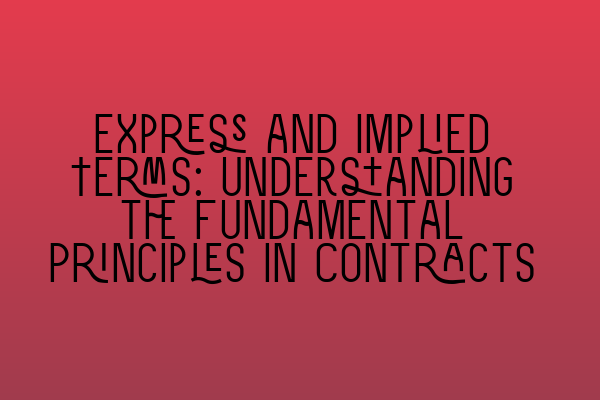Welcome to the SQE Contract Law blog, where we provide expert insights and guidance on various legal topics. In this post, we will delve into the fundamental principles of express and implied terms in contracts. Whether you are a solicitor, legal professional, or simply interested in contract law, this article will provide valuable information and enhance your understanding of this essential topic.
Before we dive into the specifics, we want to remind you to check out our related articles:
- Navigating Legal Challenges and Pitfalls in Your Practice
- Barrister vs. Solicitor: A Comprehensive Comparison
- Exploring Different Solicitor Specializations: Finding Your Niche
- Top Recommendations for Law Schools in the UK
- Embracing the Rise of Virtual Law Practices
What are Express and Implied Terms?
In any contractual agreement, the terms define the rights and obligations of the parties involved. Express terms are explicitly stated by the parties in either written or oral form. They may cover a wide range of aspects, such as price, delivery, quality, payment terms, and more. Express terms are crucial as they provide certainty and clarity to the parties involved.
Implied terms, on the other hand, are not explicitly stated but are read into the contract to give effect to the intentions of the parties or to fill in gaps within the agreement. These terms are typically implied by law or custom and are necessary to make the contract workable and fair.
The Importance of Express and Implied Terms
Understanding and identifying the express and implied terms in a contract is of utmost importance. Express terms serve as the foundation of the contractual relationship, providing a clear framework for both parties to adhere to. They help avoid misunderstandings and disputes, as all parties are aware of their respective rights and obligations.
Implied terms, on the other hand, ensure that the contract functions as intended, even if certain aspects were not explicitly addressed in the written agreement. These terms fill in gaps and provide essential protections and duties that may not have been expressly mentioned. Implied terms also reflect the reasonable expectations of the parties involved and help maintain fairness and balance in the agreement.
Identifying Express Terms
Express terms should be clearly stated in the contract and leave no room for ambiguity. They can be found in various forms such as written documents, emails, or even verbal conversations. When interpreting express terms, courts aim to give effect to the intentions of the parties involved while considering the objective meaning of the words used.
It is essential to ensure that all express terms are properly documented and agreed upon by the parties. Having written records of the agreed-upon terms can serve as valuable evidence in case of any disputes or disagreements down the line. Clear and well-drafted express terms provide certainty and help establish a solid legal foundation for the contract.
Understanding Implied Terms
Implied terms can be derived from various sources, including legislation, common law, custom, trade usage, and previous dealings between the parties. There are two main types of implied terms:
- Terms Implied by Law: These are terms automatically included in certain types of contracts by virtue of legislation or judicial decisions based on public policy or legal principles. For example, the Sale of Goods Act 1979 implies terms regarding product quality and fitness for purpose in contracts for the sale of goods.
- Terms Implied by Fact: These terms are implied into contracts based on the specific circumstances surrounding the agreement. They are necessary to give business efficacy to the contract or to reflect the reasonable expectations of the parties. For example, a term regarding payment within a reasonable time may be implied if no specific payment terms were expressly agreed upon.
It is important to note that not all implied terms will apply to every contract. The presence and extent of implied terms depend on various factors, including the nature of the contract, the intentions of the parties, the custom and trade usage, and applicable legislation.
When do Implied Terms Arise?
Implied terms may arise in multiple situations, such as:
- Terms implied to give effect to the intentions of the parties
- Terms implied to fill gaps within the contract
- Terms implied to protect the reasonable expectations of the parties
- Terms implied by law to ensure fairness and reasonableness
It is crucial to analyze the specific circumstances of each case and thoroughly review the contract to identify any implied terms that may arise.
Conclusion
In conclusion, understanding the principles of express and implied terms is vital for any legal professional or individual entering into a contract. Express terms provide clarity and certainty, while implied terms ensure fairness and balance. By identifying and considering both express and implied terms, parties can create well-drafted agreements that reflect their intentions and protect their interests.
For more legal insights and guidance, be sure to explore our related articles:
- Navigating Legal Challenges and Pitfalls in Your Practice
- Barrister vs. Solicitor: A Comprehensive Comparison
- Exploring Different Solicitor Specializations: Finding Your Niche
- Top Recommendations for Law Schools in the UK
- Embracing the Rise of Virtual Law Practices
If you have any further questions or require professional legal assistance, do not hesitate to contact SQE Contract Law. We are here to provide expert advice and support to meet your legal needs.
Thank you for reading.
Disclaimer: The information provided in this article is for general informational purposes only and does not constitute legal advice. For legal advice tailored to your specific situation, it is always recommended to consult with a qualified solicitor or legal professional.
